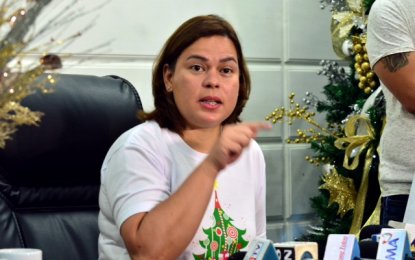
DAVAO CITY — Mayor Sara Z. Duterte said she will be abstaining from participating in the selection of the Indigenous Peoples’ Mandatory Representative (IPMR) to the City Council pending the decision of the lower court on the legal action initiated by the previously-chosen Bagobo-Klata representative.
Mayor Sara said the city would want to wait for the court’s final decision on the case filed by Cherry Ann Codilla, who was chosen by the Bagobo-Klata tribe to sit as IPMR, but was disqualified by the National Commission on Indigenous Peoples (NCIP) on the grounds of bloodline and track record.
“We shall await the court’s final decision on the merits of the said case before we move forward on the matter,” Sara said in response to the letter of Cristito Ingay, the provincial officer of NCIP-11.
Ingay sent the letter to the mayor seeking her support on the IPMR selection to ensure the success of the second selection activity.
In justifying the city’s abstention on the selection process, Sara referred NCIP to the legal opinion penned by lawyer Osmundo Villanueva of the City Legal Office that the argument of Codilla in relation to her genealogy and track record is meritorious — and that prior resolution was required before the holding of another selection process.
The legal opinion said it also found serious procedural and substantial flaws in NCIP’s disqualification process, “not to mention the attendant blunders committed in the selection process.”
The legal officer recommended that the mayor exert all efforts to defer another selection process until the pending case is resolved.
It may be recalled that the NCIP did not issue a Certificate of Affirmation (COA) to Codilla, and instead served the notice to disqualify her because she did not meet the eligibility requirements on ancestral lineage and track record in serving the IP community.
NCIP said Codilla only has 6.25 percent Bagobo-Klata blood when her genealogical details were validated by the NCIP.
NCIP said that except for her service at the Talaukom or the IP council of elders, Codilla has no other track record to show she was actively engaged in the IP community in the past five years.
The 31-year-old Codilla was selected by a majority of the Bagobo-Klata tribe during a selection process in April last year, with overwhelming votes of 241 out of the 431 members of the Talaukom.
When Codilla, a registered nurse, submitted her records for the issuance of a COA, the NCIP took notice of two issues hampering her eligibility — her genealogical status that she is not at least 25 percent Bagobo-Klata by blood, contrary to the documents she submitted.
The Certificate of Ancestral Domain Title used to determine her ancestral lineage showed her bloodline was traced from her great-great grandparents of mixed Obo-Manobo, Bagobo-Tagabawa, Bagobo-Klata down to her parents with inter-marriage to Visayans.
Under the rules and guidelines of the Indigenous Peoples’ Rights Act, an IPMR should have 100 percent or at least 25 percent blood of the IP tribe.
Codilla contested the NCIP’s decision before Branch 53 of the Regional Trial Court here.
Following her disqualification, the NCIP has extended the term of Bai Halila Sudagar of the Kagan tribe on holdover status until her successor is selected.
During the May 13 midterm election, Sudagar ran for a City Council seat and lost.